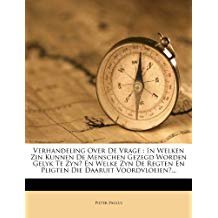What is being human? / Wat is de mens? (4)

In the past few days I've posted a few translated sentences of the Dutch book [1], which is written by the chairman of the first National Assembly in The Netherlands (1796), named Pieter Paulus. The purpose of this meeting was to design the first Dutch constitution.
Yesterday I posted the last sentence of the introduction of the book, by writing that every human being arises from the reflected principle that man is a specific and special expression of the good on earth.
The content of the book is about the equality of people and is divided into two parts, namely 1. The equality of people in their natural state and 2. The equality of people in their civilian state.
Today I will post my translation of the first sentence of chapter one of the book, that is about the equality of people in their natural state.
Regarding the question: “In what way people can be deemed equal? ” – I can not say anything else than that all human beings are, in a moral sense, equal in their natural state. I can not come up with a reason why one man in his natural state at his birth, would be more or less, and would have more or less right to the goods of the world, than his fellow man.
Met betrekking tot de vraag: “In welk opzicht kunnen de mensen geacht worden gelijk te zijn? ” – kan ik niet anders zeggen dan dat alle mensen in moreel opzicht van nature gelijk zijn. Ik kan geen reden bedenken waarom de ene mens in zijn natuurlijke staat bij zijn geboorte meer of minder zou zijn, en meer of minder recht heeft op de goederen van de wereld, dan zijn medemens.
[1] Pieter Paulus, 1793, Verhandeling over de vrage: in welken zin kunnen de menschen gezegd worden gelyk te zyn? En welke zyn de regten en pligten, die daaruit voordvloeien?Link.